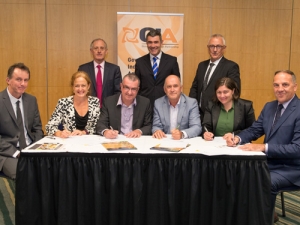Editorial: Happy days
OPINION: The year has started positively for New Zealand dairy farmers and things are likely to get better.
 From left to right: David Teulon (B3), Jen Scoular (NZ Avocado), Allan Pollard (Pipfruit NZ), Barry O'Neill (KVH), Rebecca Fisher (NZ Citrus Growers Inc), Andrew Coleman (MPI). Top row: Martyn Dunne (MPI), Minister for Primary Industries, Hon Nathan Guy, Philip Manson (NZ Wine Growers).
From left to right: David Teulon (B3), Jen Scoular (NZ Avocado), Allan Pollard (Pipfruit NZ), Barry O'Neill (KVH), Rebecca Fisher (NZ Citrus Growers Inc), Andrew Coleman (MPI). Top row: Martyn Dunne (MPI), Minister for Primary Industries, Hon Nathan Guy, Philip Manson (NZ Wine Growers).
An operational agreement to reduce the damaging impacts of a fruit fly incursion has been signed by a number of horticulture industry groups.
Fruit Fly Council chairman, Philip Manson says that the council is pleased to have finalised the agreement after months of negotiations amongst the parties. "This means the horticulture sector and the Ministry for Primary Industries can work together to manage and help reduce the impacts of fruit fly on the sector," says Mr Manson.
"Fruit flies are one of the biggest biosecurity threats facing horticulture. A fruit fly incursion could cost the horticulture industry up to $2.1 billion (calculated as the annual value of first point of sales). Eighty percent of this value is represented by signatories to the agreement, who will be partners in joint decision making under Government Industry Agreement (GIA) for readiness and response."
This is the first such agreement under GIA. It sets out the operational requirements for readiness and response activities and cost-sharing arrangements between Government and affected industries.
"By working together under GIA, Government and affected industries can achieve far greater outcomes than working in isolation. The agreement clearly sets out the roles and responsibilities of all the parties, and how joint activities will be funded between all the parties," says Mr Manson.
The agreement was signed by the parties at the B3 – Better Border Biosecurity Conference with the Minister for Primary Industries, Nathan Guy. Other attendees included representatives of the signing industry groups, the Ministry for Primary Industries (MPI) and the GIA Secretariat.
Initial signatories to the operational agreement are Pipfruit NZ, Kiwifruit Vine Health, New Zealand Avocado Growers Association Inc, New Zealand Citrus Growers Inc and the Ministry for Primary Industries.
For more information or to view a copy of the agreement summary, visit www.gia.org.nz.
European dairy giant Arla Foods celebrated its 25th anniversary as a cross-border, farmer-owned co-operative with a solid half-year result.
The sale of Fonterra’s global consumer and related businesses is expected to be completed within two months.
Fonterra is boosting its butter production capacity to meet growing demand.
For the most part, dairy farmers in the Waikato, Bay of Plenty, Tairawhiti and the Manawatu appear to have not been too badly affected by recent storms across the upper North Island.
South Island dairy production is up on last year despite an unusually wet, dull and stormy summer, says DairyNZ lower South Island regional manager Jared Stockman.
Following a side-by-side rolling into a gully, Safer Farms has issued a new Safety Alert.